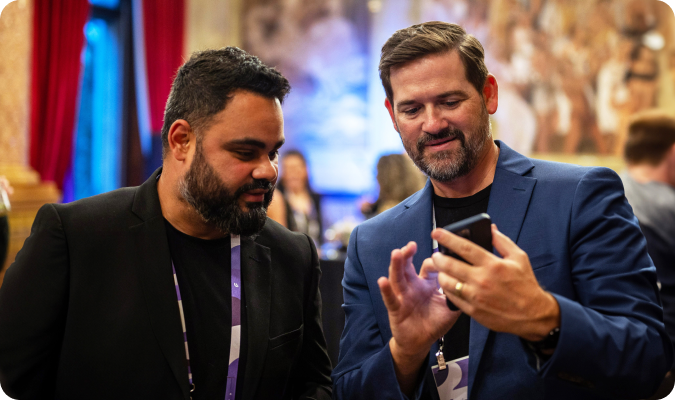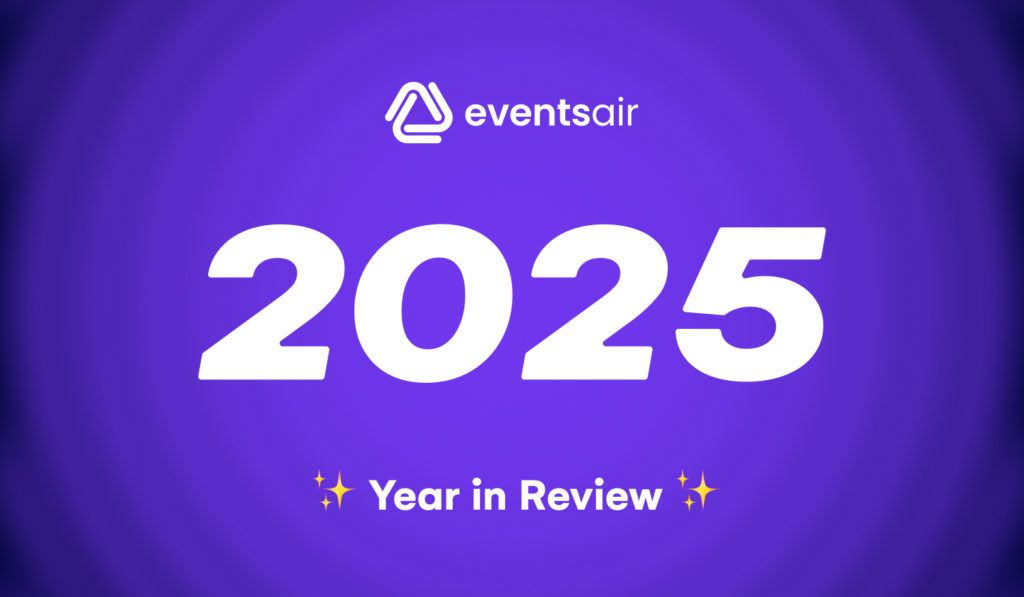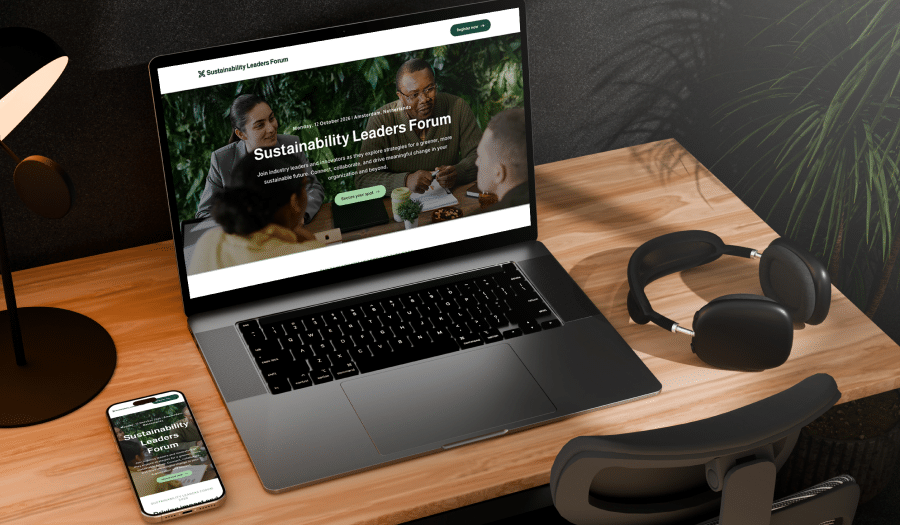
We bring people together at events for a reason. Whether it’s a conference, seminar, webinar, or virtual summit, we’re often trying to inform, inspire, entertain, or connect people. For guests to leave an event feeling like it was time well spent, we need to ensure that they are engaged by the activities, people, and information on offer. We’ll explore a variety of virtual, hybrid, and in-person audience engagement ideas and the role of technology in event engagement.
What is event engagement?
Event engagement sums up the interactions, experiences, and connections that attendees might have at an event. It happens when guests are captivated and moved by the experiences and people present.
If an attendee is engaged in an event, they might actively participate in discussions and interactive sessions. They could be seen engaging in networking activities or getting involved with hands-on activities.
Why is audience engagement at events important?
Audience engagement at events is important because it increases the chance that guests will be influenced by the experience and take action.
For example, event organizers would want to engage attendees so that they are more likely to:
- Become repeat attendees and book the next event.
- Tell colleagues or friends about the event.
- Share their experiences on social media.
- Create new connections and build their networks.
- Buy into a promoted product or service.
- Remember the brands that sponsored the event.
How to tell if an event is engaging for the audience
In the past, event planners would have to assess the vibe in the room to determine if their event was engaging. They would watch audience interactions, body language, and verbal cues to measure audience engagement.
However, event planners now have many more tools to gauge the buzz in the room. Real-time survey tools make pulse checks timely and easy. Other digital touchpoints such as social media channels and audience engagement apps for events can also track social mentions, impressions, live poll participation, Q&A responses, and game engagement rates. Post-event surveys and feedback can also gather event audience engagement data.
How to develop an event engagement strategy:
Most people attending events want to feel engaged in some way. Understanding what’s meaningful to them is the key to creating a successful event engagement strategy. Once the goals and value-add are clear, it’s easier to plan event communications and activities that generate excitement and deliver on expectations.
Pre-event engagement strategy
You should start planning your event engagement strategy well before the main show. A little bit of planning can go a long way in creating a memorable event.
Run polls and surveys
Use pre-event polls and surveys to find out what people expect from the event and how they want to be engaged. This can help you tailor your planning efforts early on.
Create a buzz with gamification
Start sharing some of the event games that attendees can participate in. Tap into their competitive side with leaderboards, interactive quizzes, and social media competitions where they can win prizes.
Personalize communication
Tailor your event marketing and communications to audience preferences where possible. Your email updates, invitations, and event app experiences can spark excitement and make people feel welcome.
Facilitate networking
Help attendees build connections before the event through online forums, networking groups, and virtual meetups. This makes it easier for them to kick-start conversations and build rapport as soon as they arrive.
Book compelling speakers or performers
Human interest is one of the main drawcards for any event. Secure and promote inspiring special guests who will make the event unforgettable for your audience.
Create interest through social media
Be present on social media and visible to your target audience. You can create an event and invite people to RSVP. You can also use the event page to post articles, ask questions, and start discussions.
Plan the seating arrangements
You can be strategic about seating so that people are more likely to engage and connect. Make the seating plan visible at the event with signage or an event app.
Run a countdown
Countdowns create a sense of FOMO for your event and can help you drive registrations, especially when the date gets closer.
Prepare last-minute communications
Just before your event, communicate with your attendees to address any last-minute questions or concerns they might have. For example, you could share location information, dress code requirements, check-in instructions, and event-app installation guidance so that they are set up for success before they arrive.
Increasing audience engagement during an event
The event is where the magic happens. There are a lot of activities and resources that you can feature at your event to increase audience engagement. Your plans don’t have to be over the top. Meaningful engagement relies on thoughtful activities that add value.
Open with a powerful keynote
Compelling keynote speakers and interesting sessions are big drawcards for events. If your budget allows, hire the best expert in the field. Brief your speakers on the aim of the event so they understand audience expectations and feel comfortable.
Facilitate interactive sessions
Interactive activities such as live polls, Q&A sessions, live demonstrations, and group sessions encourage active participation. Using an event app, you can run these in real-time and broadcast the results as they come in on a presentation screen. Live feedback can also be used to increase event audience engagement on the go.
Leverage gamification
Quizzes, challenges, rewards, and leaderboards incentivize engagement and create a sense of friendly competition among attendees. You can encourage attendees to engage to earn points, accumulate badges, or redeem coins to purchase gifts and collect rewards.
Provide networking opportunities
Dedicated networking breaks, virtual lounges, or matchmaking sessions can facilitate meaningful connections and conversations among attendees.
Create opportunities to meet special guests
If you have booked an influencer or important spokesperson for your event, you should actively promote any opportunities for guests to meet and engage them.
Get social
Use social media to increase event engagement and create communities where your audience can connect. For example, Instagram stories and hashtags can create excitement for event features and activities. The EventStream private social network on EventsAir also provides a platform where attendees can share photos, videos, and comments in real-time at the event, allowing them to network and stay up to date with what’s going on.
Fostering post-event audience engagement
The days or weeks after your event are a window for building a long-term relationship. Your event might still be front of mind for many people and it’s a great time to gather audience feedback and influence guests.
Provide a content recap
Share event highlights, key takeaways, and session recordings with attendees post-event to reinforce learning and ensure the event has long-term value in their lives.
Let your audience stream on-demand content
Engage more people and increase the ROI of keynote sessions by sharing your event content on-demand. Viewers can stream at their leisure and you could monetize the content to create a passive revenue stream for your event.
Facilitate ongoing communication
Keep the lines of communication open with attendees through follow-up emails, surveys, and newsletters. You can also provide information on upcoming events and advise guests on how to stay in touch.
Build a community
If you want to continue building the network you have started building for your sponsors, think about how you can cultivate and facilitate a community. You could create private groups where peers can continue discussions, share insights, and collaborate long after the event concludes.
Gather feedback
Share surveys and invite feedback so you can make your next event even more engaging and valuable for your guests. Tailor your questions to find out what they did or didn’t enjoy about your event, and gauge whether or not their expectations were met.
Remember to thank your guests
There is no event without your guests. Make sure you thank people for their contribution to the event in your follow-up communications.
How to measure event audience engagement
There are a lot of tools you can use to measure audience engagement. Using an event planning platform, you can track event engagement metrics such as session attendance, participation rates in interactive activities, social media engagement, and post-event survey responses. By incorporating digital touchpoints pre-event, during the event, and post-event, you can gather engagement data throughout the entire experience. EventsAir also provides a powerful event analytics portal behind the scenes so you can analyze how people engage with your events.
This data can help you report event outcomes to key stakeholders and sponsors. It can also offer many learnings and insights for future events.
Boost audience engagement at your next event
These event engagement ideas and strategies can be implemented at future events. It doesn’t matter if you’re hosting an in-person, online, virtual, or hybrid event. Using planning, creativity, and a touch of technology, you can make your next event a memorable and valuable experience for everyone involved.
Attendee Engagement | Attendee Experience | Event Technology & Apps
See EventsAir in action
Discover why 12,000+ event professionals trust EventsAir to deliver effortless events, every time.




